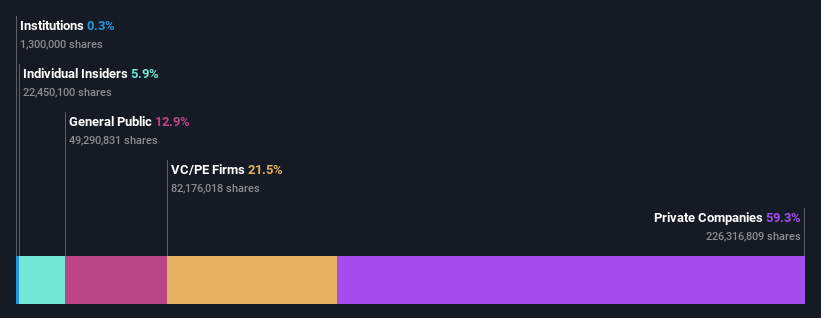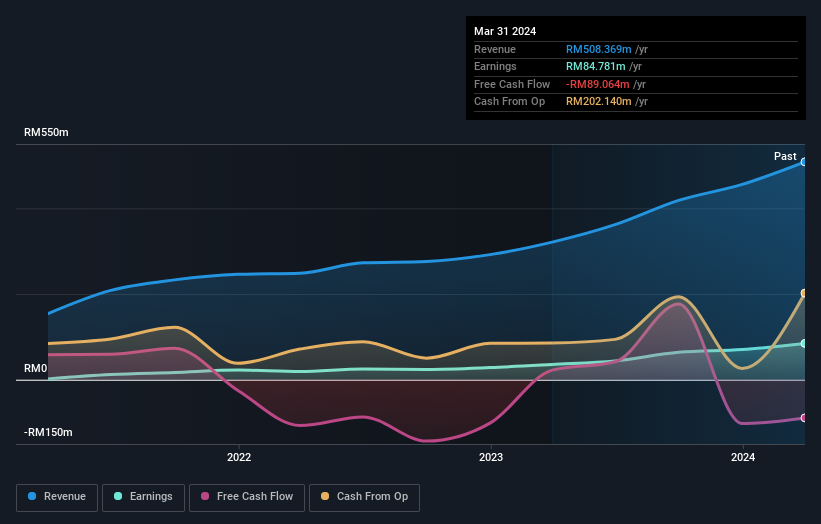Plenitude Berhad (KLSE:PLENITU) stock most popular amongst private companies who own 59%, while private equity firms hold 22%
Key Insights
The considerable ownership by private companies in Plenitude Berhad indicates that they collectively have a greater say in management and business strategy
54% of the business is held by the top 2 shareholders
Ownership research, combined with past performance data can help provide a good understanding of opportunities in a stock
If you want to know who really controls Plenitude Berhad (KLSE:PLENITU), then you'll have to look at the makeup of its share registry. And the group that holds the biggest piece of the pie are private companies with 59% ownership. In other words, the group stands to gain the most (or lose the most) from their investment into the company.
And private equity firms on the other hand have a 22% ownership in the company.
Let's delve deeper into each type of owner of Plenitude Berhad, beginning with the chart below.
Check out our latest analysis for Plenitude Berhad
What Does The Lack Of Institutional Ownership Tell Us About Plenitude Berhad?
Institutional investors often avoid companies that are too small, too illiquid or too risky for their tastes. But it's unusual to see larger companies without any institutional investors.
There are many reasons why a company might not have any institutions on the share registry. It may be hard for institutions to buy large amounts of shares, if liquidity (the amount of shares traded each day) is low. If the company has not needed to raise capital, institutions might lack the opportunity to build a position. On the other hand, it's always possible that professional investors are avoiding a company because they don't think it's the best place for their money. Plenitude Berhad might not have the sort of past performance institutions are looking for, or perhaps they simply have not studied the business closely.
Plenitude Berhad is not owned by hedge funds. The company's largest shareholder is Ikatan Bina Sdn Bhd, with ownership of 32%. In comparison, the second and third largest shareholders hold about 22% and 5.5% of the stock.
A more detailed study of the shareholder registry showed us that 2 of the top shareholders have a considerable amount of ownership in the company, via their 54% stake.
While it makes sense to study institutional ownership data for a company, it also makes sense to study analyst sentiments to know which way the wind is blowing. Our information suggests that there isn't any analyst coverage of the stock, so it is probably little known.
Insider Ownership Of Plenitude Berhad
The definition of company insiders can be subjective and does vary between jurisdictions. Our data reflects individual insiders, capturing board members at the very least. Management ultimately answers to the board. However, it is not uncommon for managers to be executive board members, especially if they are a founder or the CEO.
I generally consider insider ownership to be a good thing. However, on some occasions it makes it more difficult for other shareholders to hold the board accountable for decisions.
We can report that insiders do own shares in Plenitude Berhad. It has a market capitalization of just RM630m, and insiders have RM37m worth of shares, in their own names. Some would say this shows alignment of interests between shareholders and the board, though we generally prefer to see bigger insider holdings. But it might be worth checking if those insiders have been selling.
General Public Ownership
The general public-- including retail investors -- own 13% stake in the company, and hence can't easily be ignored. While this size of ownership may not be enough to sway a policy decision in their favour, they can still make a collective impact on company policies.
Private Equity Ownership
Private equity firms hold a 22% stake in Plenitude Berhad. This suggests they can be influential in key policy decisions. Some investors might be encouraged by this, since private equity are sometimes able to encourage strategies that help the market see the value in the company. Alternatively, those holders might be exiting the investment after taking it public.
Private Company Ownership
We can see that Private Companies own 59%, of the shares on issue. Private companies may be related parties. Sometimes insiders have an interest in a public company through a holding in a private company, rather than in their own capacity as an individual. While it's hard to draw any broad stroke conclusions, it is worth noting as an area for further research.
Next Steps:
While it is well worth considering the different groups that own a company, there are other factors that are even more important. Be aware that Plenitude Berhad is showing 1 warning sign in our investment analysis , you should know about...
If you would prefer check out another company -- one with potentially superior financials -- then do not miss this free list of interesting companies, backed by strong financial data.
NB: Figures in this article are calculated using data from the last twelve months, which refer to the 12-month period ending on the last date of the month the financial statement is dated. This may not be consistent with full year annual report figures.
Have feedback on this article? Concerned about the content? Get in touch with us directly. Alternatively, email editorial-team (at) simplywallst.com.
This article by Simply Wall St is general in nature. We provide commentary based on historical data and analyst forecasts only using an unbiased methodology and our articles are not intended to be financial advice. It does not constitute a recommendation to buy or sell any stock, and does not take account of your objectives, or your financial situation. We aim to bring you long-term focused analysis driven by fundamental data. Note that our analysis may not factor in the latest price-sensitive company announcements or qualitative material. Simply Wall St has no position in any stocks mentioned.
Have feedback on this article? Concerned about the content? Get in touch with us directly. Alternatively, email editorial-team@simplywallst.com

 Yahoo Finance
Yahoo Finance 

